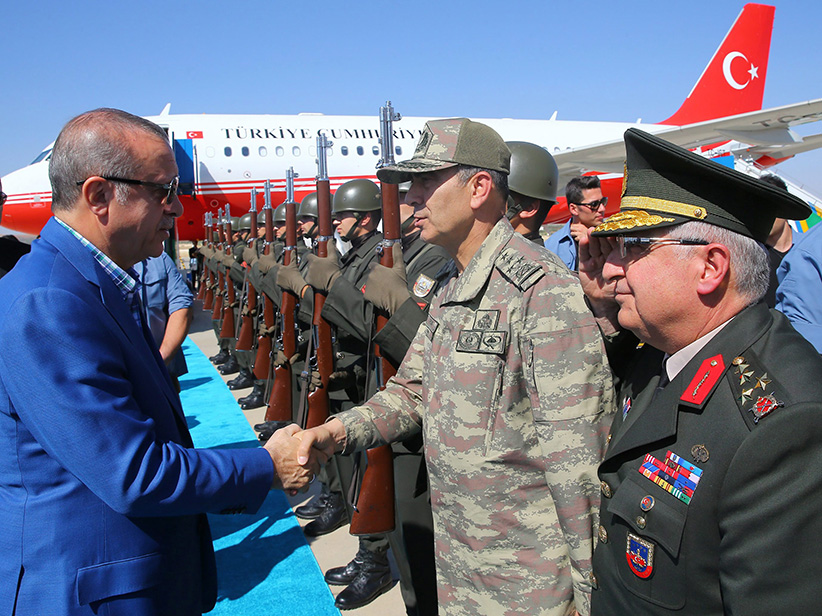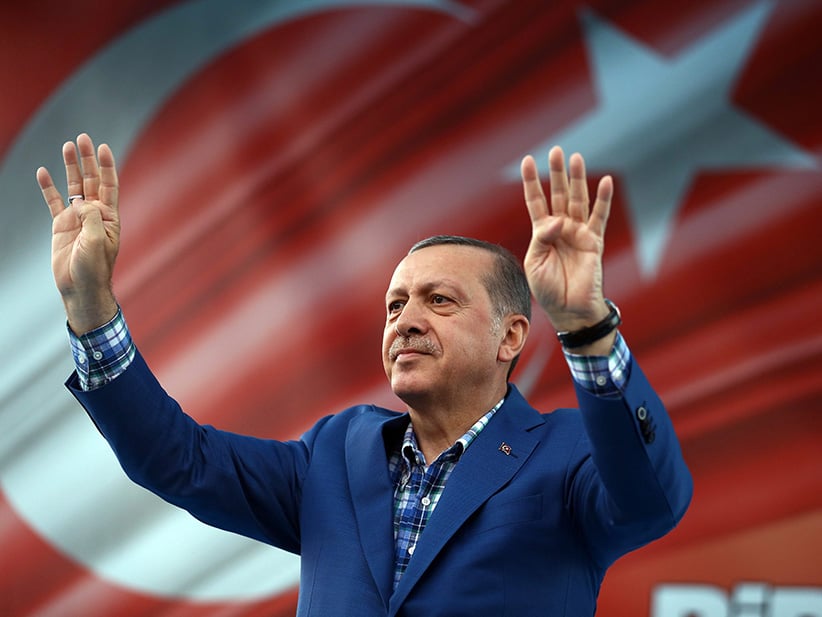Turkey just got its way. Again.
The Turkish military’s foray into Syria is a sign the regime knows it can do what it likes—international opinion be damned.
Turkey’s President Recep Tayyip Erdogan addresses a rally in Gaziantep, Turkey, Sunday, Aug. 28, 2016. Erdogan said a 14 year-old suicide bomber was responsible for last weekend’s explosion in Gaziantep that claimed dozens lives. Erdogan, speaking at a rally, says the city saw terror’s worst when “DAESH attacked with a suicide bomber,” using the Arabic acronym for the Islamic State group and adds that 34 children died in the attack. (Yasin Bulbul/AP/CP)
Share

It’s a strange combination of dysfunction and durability we’re witnessing in Turkey today. Last month it seemed NATO’s second-largest army was in free fall. A failed coup, engineered—if we are to believe Turkey’s official narrative—by a shadowy Islamist cult with tentacles stretching around the world and led by a septuagenarian supervillain living in Pennsylvania, who laid bare a military establishment riven with micro-fissures. Last week, that same military launched an offensive into the world’s most dangerous conflict, sending tanks, fighter jets and special forces across Turkey’s southern border into Syria.
The move took many observers by surprise. Was this a show of force, some asked, a messsage to the world that the Turkish military was still intact and capable? What did the timing mean?
Only days earlier, another suicide bombing attributed to the so-called Islamic State had rocked Turkey, targeting a Kurdish wedding in the country’s southeast and claiming 54 lives, 22 of them children. Turkey’s response to the worst terrorist incident in the country this year was unequivocal: “Daesh should be completely cleansed from our borders,” Mevlut Cavusoglu, Turkey’s foreign minister, told a news conference after the attack, using the Arabic acronym for the Islamic State. “We are ready to do what it takes for that.”
Still, some experts were skeptical. Islamic State militants have controlled the stretch of the Turkish border from Jarablus and approximately 50 km west since June 2013. It was the first segment of the border the militants captured and has been a critical supply route for them ever since.
In May 2013, the group reportedly carried out its first attack on Turkish soil, in the border town of Reyhanli, killing 51. Since then, they have been involved in numerous attacks, including a brutal double suicide bombing that left 103 dead in Ankara, the Turkish capital, in October 2015. Why did another attack warrant such an extreme response, particularly at a time when Turkey’s military was still recovering from the failed coup?
Within days, the answer to that question became clear. Islamic State fighters fled from Jarablus on the first day of the offensive. Turkey then quickly turned its sights on Syrian Kurds, known locally as the YPG, who had pushed west across the Euphrates River, backed by U.S. airstrikes, and driven Islamic State fighters out of Manbij, a city 30 km south of Jarablus.
The Kurds had been eyeing Jarablus and the Islamic State-controlled territory to its west for some time. It is the only region along the Turkish border they do not control and taking it would create a contiguous Kurdish territory stretching from the Iraq border to Turkey’s Mediterranean coastline.

For the Turks, that is tantamount to a national disaster. They remain committed to their view that the YPG represents more of an existential threat to Turkey than the Islamic State. No cajoling or reasoning has managed to change their minds. Indeed, Western powers have had a difficult time convincing Turkey of anything in recent years. Last spring, Turkish negotiators scored a major win after they arm-twisted the European Union into accepting a controversial refugee deal that included six billion euros (or $8.7 billion in Canadian currency) and the promise of visa-free travel for Turks in the EU. It has openly accused the U.S. of puppeteering the coup attempt and demanded American officials turn over the man they accuse of orchestrating it, though they have yet to provide any evidence of his involvement.
Despite this, the U.S. last week claimed to have supported the Turkish military push into Syria, a move the Pentagon had vigorously opposed for years.
Somehow, Turkey managed to get its way, again, despite its increasingly combative foreign policy posturing and sometimes ludicrous demands. But it’s not so hard to understand why. Turkey’s geopolitical wins reflect the key role it plays in so many of the world’s most pressing concerns, and its leaders know it. Solving Europe’s refugee crisis will be impossible without Turkish co-operation; finding a durable solution to the Syrian war will require Turkey’s active participation. Containing Russia, combating Islamic extremism, finding a sustainable balance between international human rights norms and Islamic values—all these missions require Turkey.
It’s no wonder Turkish President Recep Tayyip Erdogan and his ruling AK Party are acting like spoiled brats. In today’s world, they can get away with pretty much whatever they want. The push into Syria is only the latest example. A recent report by the Wall Street Journal, citing both Turkish and American officials, claims that the Jarablus offensive was supposed to be a joint venture between the U.S. and Turkey, originally intended to force the YPG into focusing its efforts on Raqqa, the Islamic State capital east of the Euphrates, while Turkey would take on Islamic State to the west, along its border. Thus the two American allies could be kept well apart and out of conflict with each other. But the Turks pulled the trigger early, catching the Americans, and the Kurds, by surprise.
Now, the U.S. finds itself playing referee. During his August visit to Ankara, U.S. Vice President Joe Biden warned the Kurds that they risk losing U.S. support if they do not stay to the east of the Euphrates River.
The Kurds announced they would comply but on Sunday, Turkish media reported Turkish forces moving south toward Manbij, sparking clashes with YPG fighters. The U.S. issued a second warning, this time to the Turks. U.S. Defence Secretary Ash Carter argued that the YPG “will and is withdrawing” across the Euphrates and that Turkey should remain focused on fighting the Islamic State.
It’s unlikely it will comply. Turkey’s leaders know what they want, and they know there is little the U.S., or anyone else, can do to stop them. But what they want may not be what is best—for Turkey, for Syria, or for the rest of the world.